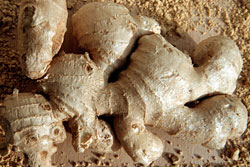Botanical name
Ginger - Zingiber officinale Roscoe
Family
Zingiberaceae
Common name
Jiang (Chinese), Adrak (Hindi), Jengibre (Spanish), Zenzero (Italian), Gingembre (French), Zanjabeel (Arabic), Ingwer (Germany)
Information about the plant
Ginger is native to Southeast Asia and is now cultivated in many areas of the tropical belt. The spice was introduced to Europe via Arab traders. In the 13th century, the plant was brought to East Africa by the Arabs, and in the 16th century by the Portuguese to West Africa. Ginger is a perennial herb, which is vegetatively propagated through its rhizomes (underground stems). Up to 1 m long, sterile, reed-like stems emerge from the tuberous rhizome sections, covered by sheaths of 20 cm long, linear-lanceolate leaves. Some shorter shoots bear inflorescences with terminal yellow flowers that have a purple lip.
The genus name Zingiber comes from the Sanskrit word "sringavera" = "with antlers", which describes the rhizome quite well. The species epithet officinalis, suggests that it is an old medicinal plant, because "officina" refers to the pharmacy salesroom and "officinalis" means ‘commonly used in the pharmacy’.
Medicinally used parts of plants (herbal drug)
The tuberous rhizome (rootstock - Zingiberis rhizoma) is used, the adhered threadlike roots are cut off. The rhizome should be cleaned and freed from the outer cork layer and then dried in the sun.
The commercially available drug comes mainly from imports from South China.
Constituents of the herbal drug
Ginger contains an aromatic essential oil and non-volatile pungent substances (gingerols and shogaols).
Quality of the drug
The quality of the ginger rhizome (Zingiberis rhizoma) is specified in the European Pharmacopoeia (Ph. Eur). The quality of ginger tincture (Zingiberis tinctura) is specified in the German Drug Codex (DAC).
Medical applications
Recognised medical use
The HMPC has confirmed the well-established use of ginger rhizome in adults to prevent nausea and vomiting in motion sickness; see also "Traditional use".
ESCOP: for the prevention of nausea and vomiting in motion sickness or related to pregnancy (under medical supervision); as a post-operative antiemetic.
Traditional use
Ginger rhizome has been classified by the HMPC as a traditional herbal medicinal product (Article 16a of Directive 2001/83/EC) for the following indication: based on long-standing use, ginger rhizome can be used in adults to treat the symptoms of mild complaints affecting the stomach or gut (including bloating and flatulence), and in adults and children to treat the symptoms of motion sickness; see also "well-established use".
Herbal drug preparations in finished dosage forms
- Cut ginger rhizome and dried extracts for tea preparation
- Powdered drug in capsules
- Alcoholic ginger extracts (including tincture) in combination with other drugs in extracts in tonic
Dosage
Finished medicinal product: see patient information leaflet.
Tea infusion for dyspeptic complaints and to stimulate the appetite: 0.5 to 1g of ginger several times a day. To prevent motion sickness: Adults and children over 6 years old should take 0.5 to 2g of powdered ginger 30 minutes before traveling.
Preparation of a tea
Pour 150 ml of boiling water over 0.5 to 1g of powdered or coarsely chopped ginger, let it stand covered for 5 minutes, then strain through a sieve.
Notes
Studies with pregnant women have shown that ginger rhizome does not cause malformations or have other fetotoxic properties. Nevertheless, pregnant women are recommended not to take it as a preventive treatment against vomiting. Due to a lack of evidence, children under the age of 6 should not take ginger rhizome.
Side effects
Mild gastrointestinal discomfort is possible.
Interactions
None known.
References
Herbal drug monographs
HMPC (2012, 2020), ESCOP (2009), WHO Vol. 1
Further literature
Commentary on the European Pharmacopoeia (Ginger rhizome, No. 1522)


